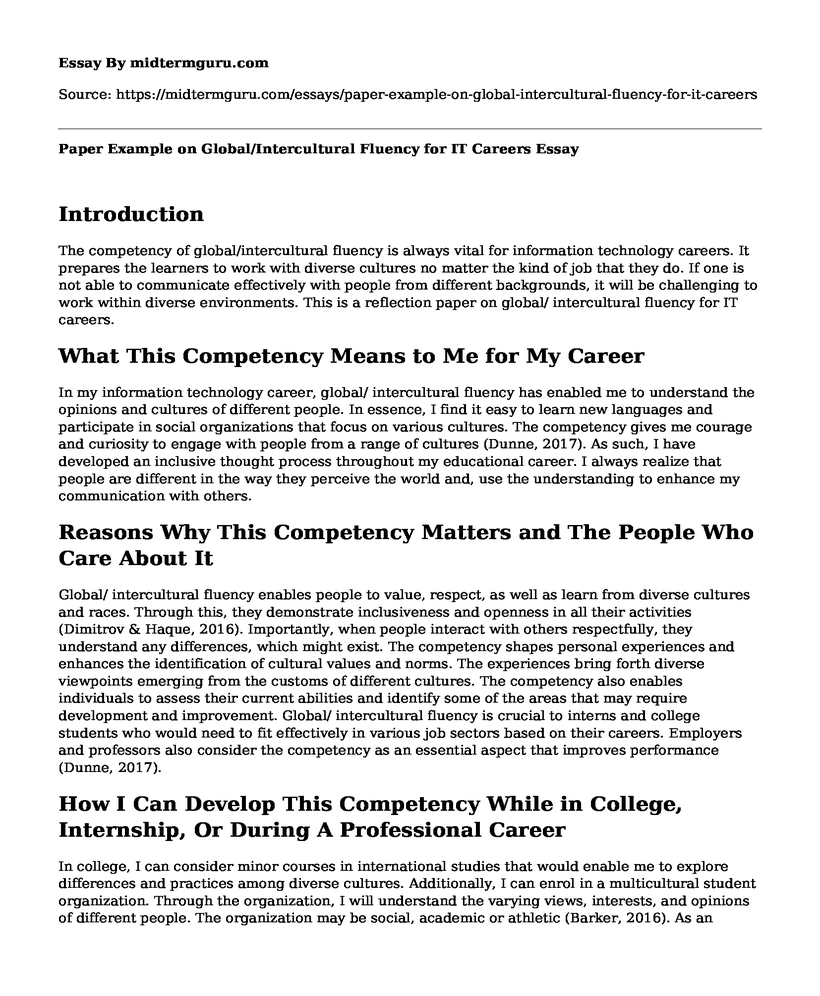Introduction
The competency of global/intercultural fluency is always vital for information technology careers. It prepares the learners to work with diverse cultures no matter the kind of job that they do. If one is not able to communicate effectively with people from different backgrounds, it will be challenging to work within diverse environments. This is a reflection paper on global/ intercultural fluency for IT careers.
What This Competency Means to Me for My Career
In my information technology career, global/ intercultural fluency has enabled me to understand the opinions and cultures of different people. In essence, I find it easy to learn new languages and participate in social organizations that focus on various cultures. The competency gives me courage and curiosity to engage with people from a range of cultures (Dunne, 2017). As such, I have developed an inclusive thought process throughout my educational career. I always realize that people are different in the way they perceive the world and, use the understanding to enhance my communication with others.
Reasons Why This Competency Matters and The People Who Care About It
Global/ intercultural fluency enables people to value, respect, as well as learn from diverse cultures and races. Through this, they demonstrate inclusiveness and openness in all their activities (Dimitrov & Haque, 2016). Importantly, when people interact with others respectfully, they understand any differences, which might exist. The competency shapes personal experiences and enhances the identification of cultural values and norms. The experiences bring forth diverse viewpoints emerging from the customs of different cultures. The competency also enables individuals to assess their current abilities and identify some of the areas that may require development and improvement. Global/ intercultural fluency is crucial to interns and college students who would need to fit effectively in various job sectors based on their careers. Employers and professors also consider the competency as an essential aspect that improves performance (Dunne, 2017).
How I Can Develop This Competency While in College, Internship, Or During A Professional Career
In college, I can consider minor courses in international studies that would enable me to explore differences and practices among diverse cultures. Additionally, I can enrol in a multicultural student organization. Through the organization, I will understand the varying views, interests, and opinions of different people. The organization may be social, academic or athletic (Barker, 2016). As an intern, I will conduct interviews to practice demonstrating intercultural fluency. The interviews will involve participants from various cultural diversities. I can also consider going global to enable me to explore job opportunities across international platforms. During my professional career, talking openly to everyone who I interact with and wanting to learn from them has helped me build global fluency. I always listen to the ideas brought forth by my colleagues hence enabling us to work collaboratively.
How I Demonstrate This Competency to Others Such as My Professors, Employers, And Colleagues in My Career Field
In my work environment, I will build sustainable connections with the organization both locally and abroad. As such, it will be easy to share and exchange ideas across geographical and cultural boundaries. Moreover, I will ensure positive multicultural engagement across the wider community and my colleagues. On the part of professors, I would gain a global outlook and strengthen strategies used internationally.
Conclusion
Global/ intercultural fluency improves the employability of individuals and supports their career development. It also strengthens interpersonal skills that may be required to build rapport and good relationships with the stakeholders. The competency promotes effective communication and brings forth an adaptive approach to intercultural situations. Therefore, this competency is fundamental for IT careers.
References
Barker, G. G. (2016). Cross-cultural perspectives on intercultural communication competence. Journal of Intercultural Communication Research, 45(1), 13-30.
Dimitrov, N., & Haque, A. (2016). Intercultural teaching competence: a multi-disciplinary model for instructor reflection. Intercultural Education, 27(5), 437-456.
Dunne, C. (2017). Can Intercultural Experiences Foster Creativity? The Relevance, Theory and Evidence. Journal of Intercultural Studies, 38(2), 189-212.
Cite this page
Paper Example on Global/Intercultural Fluency for IT Careers. (2022, Sep 13). Retrieved from https://midtermguru.com/essays/paper-example-on-global-intercultural-fluency-for-it-careers
If you are the original author of this essay and no longer wish to have it published on the midtermguru.com website, please click below to request its removal:
- Essay on Mitigating the Factors for the Client Service for Netware
- Trauma Informed Parents: Analysis of the Website
- The Integration of Multiple Different Circuits to Form a Miniaturized One Integrated Circuit (IC)
- Essay Sample on Roles and Responsibilities of the Project Board
- Supply Networks: Patterns for Value Addition & Delivery Links - Essay Sample
- Retailers Leverage Technology to Stay Ahead - Essay Sample
- A Computer's New Age: Harnessing Electrical Power to Process Data - Essay Sample







